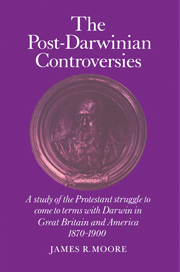 The Post-Darwinian Controversies
The Post-Darwinian Controversies Book contents
- Frontmatter
- Contents
- Dedication
- Preface
- PREFACE TO THE PAPERBACK IMPRESSION
- Introduction: the terrain of revision
- PART I HISTORIANS AND HISTORIOGRAPHY
- 1 Draper, White, and the military metaphor
- 2 Politics, polemics, and the military milieu
- 3 Warfare's toll in historical interpretation
- 4 Towards a non-violent history
- PART II DARWINISM AND EVOLUTIONARY THOUGHT
- PART III THEOLOGY AND EVOLUTION
- Conclusion: on coming to terms with Darwin
- Dedication
- Notes to the text
- Bibliography
- Index
2 - Politics, polemics, and the military milieu
Published online by Cambridge University Press: 22 January 2010
- Frontmatter
- Contents
- Dedication
- Preface
- PREFACE TO THE PAPERBACK IMPRESSION
- Introduction: the terrain of revision
- PART I HISTORIANS AND HISTORIOGRAPHY
- 1 Draper, White, and the military metaphor
- 2 Politics, polemics, and the military milieu
- 3 Warfare's toll in historical interpretation
- 4 Towards a non-violent history
- PART II DARWINISM AND EVOLUTIONARY THOUGHT
- PART III THEOLOGY AND EVOLUTION
- Conclusion: on coming to terms with Darwin
- Dedication
- Notes to the text
- Bibliography
- Index
Summary
E'er since the world evolved to form
And creatures moved upon its face,
The fittest have survived the storm
Of beasts and of the human race.
But as the world grows old 'tis seen
The fight grows fierce – 'tis hard to live,
War to the knife rages between
Mankind, and none do quarter give.
In learning, commerce, trade, and war,
Such battling, struggling, strife, was never seen before.
‘Psychosis’Military metaphors are as old as war itself. From Roman militarism came the imagery of battle contained in the New Testament, which has ever been at the disposal of Christians who believe themselves to be combating evil. From Christians, in large measure, this imagery has passed into common usage, so that even the opponents of faith have learnt to wage metaphorical war against their adversary. Thus it would not be surprising to discover that Draper, White and the prisoners of their historiography have drawn heavily on the vocabulary of a milieu in which military metaphors were rife. In particular it would appear that mid-Victorian politics, the polemics of T. H. Huxley, and the militant tactics of American Fundamentalists in the twentieth century have together furnished no small amount of unforgettably vivid military imagery to writers on science and religion. As influence can only occasionally be assigned to one or another of these aspects of the military milieu, Draper and White must still be regarded as the principal casus belli. But the influences which bore upon them and the enrichment of an entrenched historical tradition that stems from their writings are better understood with this background in mind.
- Type
- Chapter
- Information
- The Post-Darwinian ControversiesA Study of the Protestant Struggle to Come to Terms with Darwin in Great Britain and America, 1870-1900, pp. 50 - 76Publisher: Cambridge University PressPrint publication year: 1979


